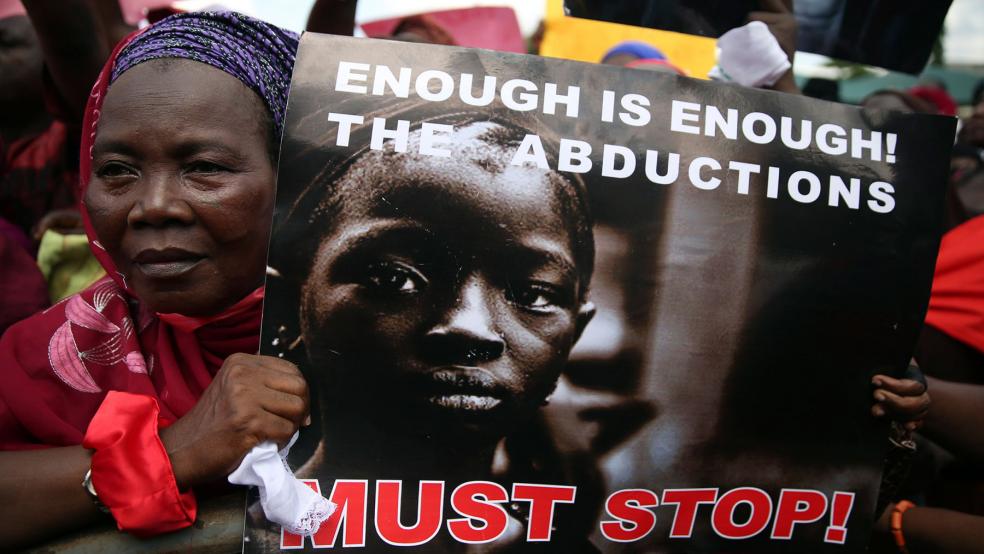The Nigerian government blinked today in its standoff with Boko Haram, agreeing to talks with the group in an effort to get back 276 schoolgirls who were kidnapped in northern Nigeria three weeks ago.
It’s another sign of weakness by the Nigerian government. So far, the government and the military have appeared feckless, unable to locate the girls in the short-term and powerless to stop the rise of the group over the last 4 years. The reason the group is so difficult to stop is simple: its members simply have nothing to lose.
Related: Obama's $100 Million African Excursion
The group has roots dating back four decades, but the modern incarnation of Boko Haram -- a name that roughly translates to “Western education is a sin” -- are born in unending cycles of poverty and corruption in northern Nigeria and the Abuja, the country’s capitol.
This poverty and corruption is often masked by the country’s economic success. In a research note circulated Tuesday, Mark Mobius at Franklin Templeton Investments said that the group’s actions would have little impact on Nigeria’s continued growth.
“GDP growth in Nigeria stood at 6.3 percent in 2013 and is projected to reach 7.1 percent this year, while South Africa grew a more modest 1.9 percent in 2013 and is projected to grow 2.3 percent in 2014,” Mobius wrote in the note. “Nigeria boasts one of the fastest-growing economies not only in Africa but in the world, with GDP growth rates above 6 percent every year since 2003.”
This impressive growth, however, is uneven. The vast majority of it takes place in the country’s Christian south, where Africa’s largest city, Lagos, is located. Further south in the Niger Delta oil companies remove some $80 billion worth of oil there each year.
Related: Libyan Mission Over, But U.S. Deeper into Africa
Economic growth in the north, on the other hand, is almost non-existent. Part of the problem is geographic; northern Nigeria is a desert without resources, so few companies want to invest there. In the north, 70 percent of people live on less than a dollar per day, compared with 50 percent in the south.
Without the benefits of an expanding economy, infrastructure in the north is nearly non-existent. The lack of infrastructure also contributes to public health problems, including polio, which has yet to be eradicated there.
This combined with political corruption -- Nigeria ranked 144 out of 177 countries on Transparency International’s 2013 Corruption Perception Index -- makes the region ripe for extremism, according to a 2012 Human Right Watch Report.
“Over the past few decades, poverty has increased, and key public institutions have crumbled. Several hundred billion dollars of public funds have been lost due to corruption and mismanagement,” the report found. “Despite the federal government’s ‘war on corruption,’ graft and corruption remain endemic at all levels of government.”
Related: Where Mandela Succeeded Obama Has Failed
Harsh Military Response
The Nigerian military’s response to the growth of Boko Haram has also alienated Nigerians. Last year, as Nigerian troops moved against the group, Secretary of State John Kerry was informed about human rights violations in their campaign.
“We are also deeply concerned by credible allegations that Nigerian security forces are committing gross human rights violations, which, in turn, only escalate the violence and fuel extremism.” Kerry said in May 2013.
Human Rights Watch and other groups have expressed similar concerns, but the Nigerian military is undeterred. There have been reports of indiscriminate firing by Nigerian troops and warplanes, as well as reports of massacres of innocent people.
Colonial Legacy
Nigeria only gained independence from the United Kingdom in 1960. Since then, in an effort to keep the peace between the north and south, the presidential office has alternated between Christians and Muslims.
This arrangement was upended in 2010, when Muslim President Umaru Yar'Adua’s death propelled current President Goodluck Jonathan, a Christian, into office.
Many Muslims wanted Jonathan to leave office in 2011 when he finished the term won by Adua. But, Jonathan chose to run and defeated Atiku Abubakar, a Muslim. For Muslims, this violated the agreement to alternate the presidency.
This led to riots across northern Nigeria and accusations that the vote was rigged. However, the African Union observers who monitored the elections said it was the closest Nigeria could come to a free-and-fair process.
“Nigeria hasn't been served too well for decades electorally, but to our pleasant surprise we found the people of Nigeria generally are the security against this," former Ghanaian President John Kufuor told the BBC in 2011. "All of them co-operating to give the nation a befitting election."
Top Reads from The Fiscal Times
- U.S. Plays Catch-Up with China on Cyber Warfare
- Scramjet: DOD’s New Screaming Fast Hypersonic Weapon
- We’re One Step Closer to Robots on the Battlefield





